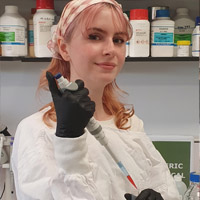Fast Facts
Location
Commencing
- Townsville: January
Fees
$9,090.00+
+estimated annual Commonwealth Supported Fee for a full-time study load. Please note this estimate is variable and subject to fluctuation depending on choice of elective subjects.
Plus Student Services and Amenities feeFee deferral and scholarships available if eligible
Currently displaying fees for 2025, which are subject to change in following years.
Duration
3 years full-time
Entry Requirements
ATAR 65
English (Units 3/4,C)
Recommended Knowledge
Mathematical Methods (Units 3/4,C), Chemistry (Units 3/4,C); plus one of Biology, Health, Physical Education or Physics
QTAC Codes
- 316071
Course detail
Discover where you excel in the medical, healthcare, clinical and research industries with a Bachelor of Biomedical Sciences. JCU’s unique course design equips you to explore multiple fields and embrace a career that’s right for you.
With only one prerequisite, English, JCU’s Bachelor of Biomedical Sciences is designed differently. We recognise that the most important prerequisite for the biomedical field is an enduring interest in expanding your learning and a commitment to helping others. Engage with foundational learning in chemistry, physics and genetics, no matter what you studied in high school.
Design the first-year program that supports you to expand your existing knowledge. Foundational subjects in chemistry and mathematics are available to students who did not complete these in secondary school. Students that already hold this assumed knowledge can explore subject offerings in bioinformatics, veterinary science, healthcare communication or general health.
Examine the wide-ranging subject areas of biomedicine in your second year and take the opportunity to explore subject areas that interest you. This broad knowledge and skill base equips you to select the major that best aligns with your study, career or research goals from your third year. Explore the majors available within the Bachelor of Biomedical Sciences in more detail below.
Biomedicine is a diverse and flexible field of study. Multiple transfer points and focused majors empower you to specialise in the career of your choice sooner. JCU is committed to equipping you with the knowledge and skills to excel across the healthcare sphere.
Engage with hands-on learning opportunities from your first year. You’ll benefit from the expertise of lecturers and industry experts as you develop valuable work skills in state-of-the-art laboratories, hospitals, and medical centres, both on- and off-campus. JCU’s small class sizes provide you with additional opportunities for personalised learning and tailored support.
JCU’s unique focus on tropical health and disease management will ensure a hands-on, practical learning experience like no other.
This flexible degree will set you on a pathway to finding the area of healthcare you are truly committed to. A Bachelor of Biomedical Sciences can act as that key springboard into a medical-related career.
View the Handbook for a detailed overview of available subjects.
Inherent requirements
Inherent requirements are the identified abilities, attributes, skills, and behaviours that must be demonstrated, during the learning experience, to successfully complete a course. These abilities, attributes, skills, and behaviours preserve the academic integrity of the University’s learning, assessment, and accreditation processes, and where applicable, meet the standards of a profession. For more information please review the inherent requirements for the Bachelor of Biomedical Sciences.
Majors
Choose from six different majors, each designed to provide you with the knowledge and skills required to specialise in key biomedical fields. All majors are offered on-campus at JCU Townsville.
Bioinformatics
Hone the skills to collect, understand and apply biological and medical data. Understand how data is managed in the medical and healthcare fields and contribute innovative solutions to complex problems. Build expertise in this rapidly expanding field that has clinical, research, and governmental applications.
Health
Be equipped for a future in the medical, dental or allied health industries. Develop an advanced understanding of anatomy, physiology and pathophysiology. Use this major as your starting point to build the foundational knowledge required to excel in the health service industries.
Medical Laboratory Science
Be at the forefront of healthcare research and diagnostics and develop extensive theoretical and medical knowledge across several fields of medical science. You will gain hands-on clinical and laboratory skills with placement opportunities and training in world-class diagnostic medical laboratories and research centres.
Explore Medical Laboratory Science
Microbiology and Immunology
Gain the skills and knowledge in the theories of epidemiology, molecular genetics, microbiology and advanced immunobiology. Extend your knowledge by understanding and analysing the theories of infectious diseases and tropical microbes.
Explore Microbiology and Immunology
Molecular and Cell Biology
Study biology at the molecular and cellular level as you explore the origins of specific diseases and disorders. Develop knowledge and skills in the fields of cell biology, genetics, immunology and bioengineering.
Explore Molecular and Cell Biology
Physiology and Pharmacology
Gain the knowledge and skills to understand and apply pathophysiology and therapeutics theory. Understand how pharmacological treatments can influence the human body's signals, responses and regulation, equipping you to excel in numerous pharmacology roles.
The expert design of the Bachelor of Biomedical Sciences prepares you for a variety of careers across industries including medicine, veterinary science, biosecurity, pharmaceuticals, research, clinical sciences and more.
JCU graduates are highly valued for their extensive practical skills, developed through varied hands-on learning opportunities. Enter the workforce with a detailed understanding of the daily operations of your chosen industry.
Benefit from the opportunity to work closely with academics and industry leaders. You’ll build a network of contacts that can assist you in developing an exciting and varied career in industries ripe for growth.
Discover just how far a career in Biomedical Science can take you. At JCU, our focus on empowering rural and regional communities within the Tropics provides unique opportunities for practical experience, many of which lead to employment after graduation.
Entry score threshold
These are the lowest adjusted scores we made an offer to in Trimester 1, 2025. Entry scores are based on the most recent Semester 1 intake and are updated in June each year. Meeting the threshold doesn't guarantee admission.
ATAR/Selection Rank: 65.00
Entry score range
This table shows the range of entry scores for recent secondary students offered a place in the Bachelor of Biomedical Sciences for Trimester 1, 2025. The table includes offers deferred to Trimester, 2025 which may have been assessed using the entry score threshold of an earlier year.
JCU Townsville
Without adjustments | With adjustments* | |
|---|---|---|
Highest | 99.35 | 99.95 |
Median | 87.15 | 91.4 |
Lowest | 58.65 | 65.65 |
Notes:
<5 – indicates less than 5 ATAR-based offers made.
* Refer to Adjustment Factors
Find out more about who you might study with by viewing this course’s student profile.
Adjustment factors
James Cook University applies bonus ranks under the Regional Preference Scheme and QTAC’s Educational Access Scheme (EAS). Learn more about JCU’s adjustment factors.
Estimated annual Commonwealth Supported fee: $AUD9,090.00
A variety of Scholarships are available to suit different student types.
Learn more about fees and financial support
JCU Prep provides a pathway into this course. Enrolling in this flexible program will enable you to meet entry requirements including subject pre-requisites and ATARs. Introductory academic subjects are also available to prepare you for tertiary study.
*Excludes entry into the Bachelor of Advanced Science, Bachelor of Dental Surgery, Bachelor of Laws, Bachelor of Marine Science, Bachelor of Medicine, Bachelor of Surgery, Bachelor of Nursing Science – Bachelor of Midwifery, Bachelor of Pharmacy (Honours), Bachelor of Physiotherapy, and Bachelor of Veterinary Science (Honours).
Note the course QTAC code for the location you've chosen. You'll need to enter it as part of your QTAC application.
Application dates vary between courses, whether they're delivered in semester, trimester or carousel study modes. View our Application due dates page for more information.
ATAR score is indicative only. Entry scores will be finalised in the major offer round.
Real stories
-

Student
Jessica Scott
Bachelor of Biomedical Sciences
I found the coursework incredibly fascinating, particularly in microbiology and immunology, which led me to major in these fields. JCU’s hands-on approach to learning and the comprehensive curriculum fuelled my curiosity and strengthened my passion for research.
-

Alumni
Sophie McIntyre
Bachelor of Biomedical Sciences
I enjoyed the research experience in biomedicine so much that I pursued further immunology study through a Master of Philosophy. The abundance of practical laboratory experience was vital and the quality mentorship and guidance in the biomedical sciences degree certainly facilitated my success.
-

Lecturer
Andrew Calcino
Bachelor of Biomedical Sciences
The Bachelor of Biomedical Sciences is designed to launch the careers of the next generation, who will continue to push the boundaries of personalised medicine and healthcare. Students are trained to use the same tools and pipelines currently utilised by modern bioinformatic researchers.
-

Lecturer
Associate Professor Ulf Schmitz
Bachelor of Biomedical Sciences
This interactive course structure, guided by the Centre for Tropical Bioinformatics and Molecular Biology, ensures that students receive the most relevant and up-to-date knowledge. The potential impact of their work on biodiversity, food production, tropical health, and more is extremely exciting.
-

Employer
Megan Harbourne
Statewide Clinical Education Program Manager, Department of Health, QLD
JCU graduates have a really strong focus on the patient journey, probably because they have developed interpretation and analysis skills across multiple sciences. They are great at understanding the pathophysiology of the various chronic diseases that impact our patients.